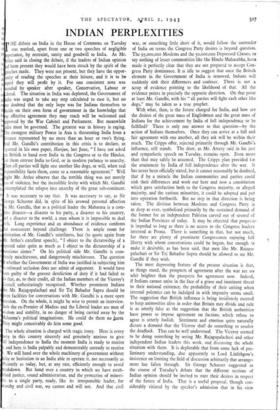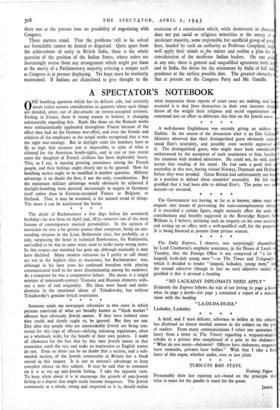INDIAN PERPLEXITIES HE debate on India in the House of
Commons on Tuesday was marked, apart from one or two speeches of negligible portance, by restraint, sanity and goodwill to India. As Mr. ttlee said in closing the debate, if the leaders of Indian opinion ad been present•they would have been struck by the spirit of the peeches made. They were not present, but they have the oppor- nity of reading the speeches at their leisure, and it is to be sped they will profit by it. For one consistent note was unded by speaker after speaker, Conservative, Labour or o 'beral. The situation in India was deplored, the Government of g idia was urged to take any step calculated' to ease it, but no w ne doubted that the only hope was for Indians themselves to ride on their own form of government in the knowledge that y effective agreement they may reach will be welcomed and pproved by the War Cabinet and Parliament. But meanwhile dia must be governed. .The greatest war in history is raging. e strongest military Power in Asia is threatening India from a istance represented by no more than an hour or two's flying. nd Mr. Gandhi's contribution in this crisis is to declare, as eported in his own paper, Harijan, last June, " I have not asked e British to hand over India to the Congress or to the Hindus. t them entrust India to God, or in modern parlance to anarchy. hen all parties will fight one another like dogs, or will, when real sponsibility faces them, come to a reasonable agreement." Well *ght Mr. Attlee observe that the terrible thing was not merely is of violence, but the incredible levity with which Mr. Gandhi ntemplated the relapse into anarchy of the great sub-continent.
It was necessary to say that. It was necessary to say, as Sir eorge Schuster did, in spite of his avowed personal affection r Mr. Gandhi, that as a political leader the Mahatma is a corn- lete disaster—a disaster to his party, a disaster to his country, nd a disaster to the world, a man whom it is impossible to deal ith. Long experience and an abundance of evidence confirms at assessment beyond challenge. There is ample room for n dmiration of Mr. Gandhi's saintliness, but (to quote again from r. Attlee's excellent speech), " I object to the dictatorship of a puted saint quite as much as I object to the dictatorship of a torious sinner." On his political side Mr. Gandhi is com- letely mischievous, and dangerously mischievous. The question whether the Government of India was justified in subjecting him enforced seclusion does not admit of argument. It would have en guilty of the gravest dereliction of duty if it had failed to o that, as, to their credit, all the Indian members of the Viceroy's until, unhesitatingly recognised. Whether prominent Indians e Mr. Rajagopalachari and Sir Tej Bahadur Sapru should be yen facilities for conversations with Mr. Gandhi is a more open uestion. On the whole, it might be wise to permit an interview. th the ex-Premier of Madras and the Liberal leader are men of isdom and stability, in no danger of being carried away by the lahatma's political imaginations. He could do them no barm. ey might conceivably do him some good.
The whole situation is charged with tragic irony. Here is every rty in this country sincerely and genuinely anxious, to give ull independence to India the moment India is ready to receive , and here is India palpably and demonstrably unready to receive We will hand over the whole machinery of government without lay or hesitation to an India able to operate it, not necessarily as fficiently as today, but, at any rate, efficiently enough to avoid reakdown. But hand over a country in which we have estab- shed justice, sound administration, and the protection of minori- es to a single party, ready, like its irresponsible leader, for narchy and .civil war, we cannot and will not. And that civil war, or something little short of it, would follow the surrender of India on terms the Congress Party desires is beyond question. The 95,000,000 Moslems and the 5o,000,000 Depressed Classes, to say nothing of lesser communities like the Hindu Mahasabha, have made it perfectly clear that they are not prepared to accept Con- gress Party dominance. It is idle to suggest that once the British element in the Government of India is removed, Indians will suddenly sink their differences and coalesce. There is not a scrap of evidence pointing to the likelihood of that. All the evidence points in precisely the opposite direction. On that point at least Mr. Gandhi, with his " all parties will fight each other like dogs," may be taken as a true prophet.
With what, then, is the future charged for India, and how are the des'ires of the great mass of Englishmen and the great mass of Indians for the achievement by India of full independence to be fulfilled? There is only one answer to that question—by the action of Indians themselves. Once they can arrive at a full and . fair agreement with one another, all they ask will be within their reach. The Cripps offer, rejected primarily through Mr. Gandhi's influence, still stands. The door, as Mr. Amery said in his just and sympathetic speech on Tuesday, remains open. Even more than that may safely be assumed. The Cripps plan provided for the attainment by India of full, ndependence after the war. It has never been officially stated, but it cannot reasonably be doubted, that if by a miracle the Indian communities and parties could sink their differences and work out here and now a constitution which gave satisfaction both to the Congress majority, or alleged majority, and the various minorities, it could be adopted and put into operation forthwith. But no step in that direction is being taken. The division between Moslems and Congress Party is as deep as ever, symbolised primarily by the sustained demand of the former for an independent Pakistan carved out of several of the Indian Provinces of today. It may be objected that progress- is impeded so long as there is no access to the Congress leaders interned at Poona. There is something in that, but not much, for there are plenty of prominent Congressmen enjoying full liberty with whom conversations could be begun, but enough to make it desirable, as has been said, that men like Mr. Rajago- palachari or Sir Tej Bahadur Sapru should be allowed to see Mr. Gandhi if they wish.
The most depressing feature of the present situation is that, as things stand, the prospects of agreement after the war are no whit brighter than the prospects for agreement now. Indeed, if Indians cannot unite in the face of a grave and imminent threat to their national existence, the probability of their uniting when internal polemics can be indulged in with impunity seems small. The suggestion that British influence is being insidiously exerted to keep animosities alive in order that Britain may divide and rule is as utterly false as the suggestion that the British authorities have power to impose agreement on factions which refuse to agree is utterly foolish. Sentiment and emotion quite naturally dictate a demand that the Viceroy shall do something to resolve the deadlock. That can be well understood. The Viceroy seemed to be doing something by seeing Mr. Rajagopalachari and other independent Indian leaders this week, and discussing the whole situation with them. It is deplorable that from some lack of pre- liminary understanding, due apparently to Lord Linlithgow's insistence on limiting the field of discussion arbitrarily that arrange.. ment has fallen through. Sir George Schuster suggested in the course of Tuesday's debate that the different sections of Indian opinion should be invited to state their desires in respect of the future of India. That is a useful proposal, though con- siderably vitiated by the speaker's admission that in his view there was at the present time no possibility of negotiating with Congress.
There matters stand. That the problems still to be solved are formidable cannot be denied or disguised. Quite apart from the achievement of unity in British India, there is the whole question of the position of the Indian States, whose rulers are increasingly averse from any arrangement which might put them at the mercy of a Parliamentary majority evincing a temper such as Congress is at present displaying. Yet hope must be resolutely maintained. If Indians are disinclined to give thought to the evolution of a constitution which, while democratic in characte does not put racial or religious minorities at the mercy of intolerant majority, some responsible but unofficial group of peep here, headed by such an authority as Professor Coupland, mig' well apply their minds to he matter and outline a plan for consideration of the moderate Indian leaders. On one po at any rate, there is general and unqualified agreement both he and in India, the desire for the attainment by India of full ind, pendence at the earliest possible date. The greatest obstacles that at present are the Congress Party and Mr. Gandhi.



























 Previous page
Previous page